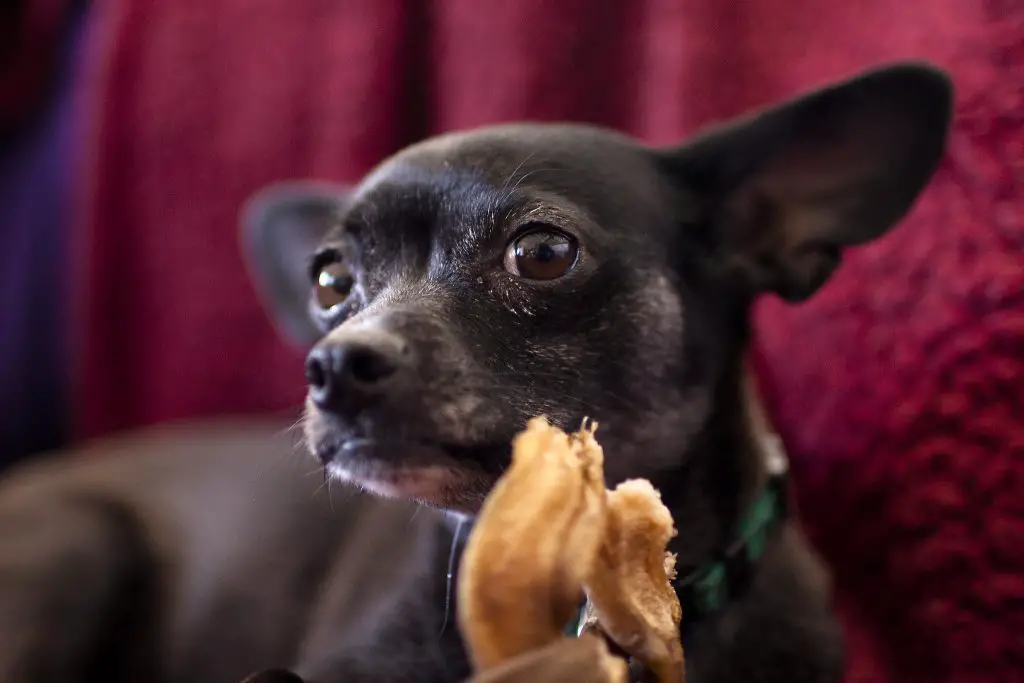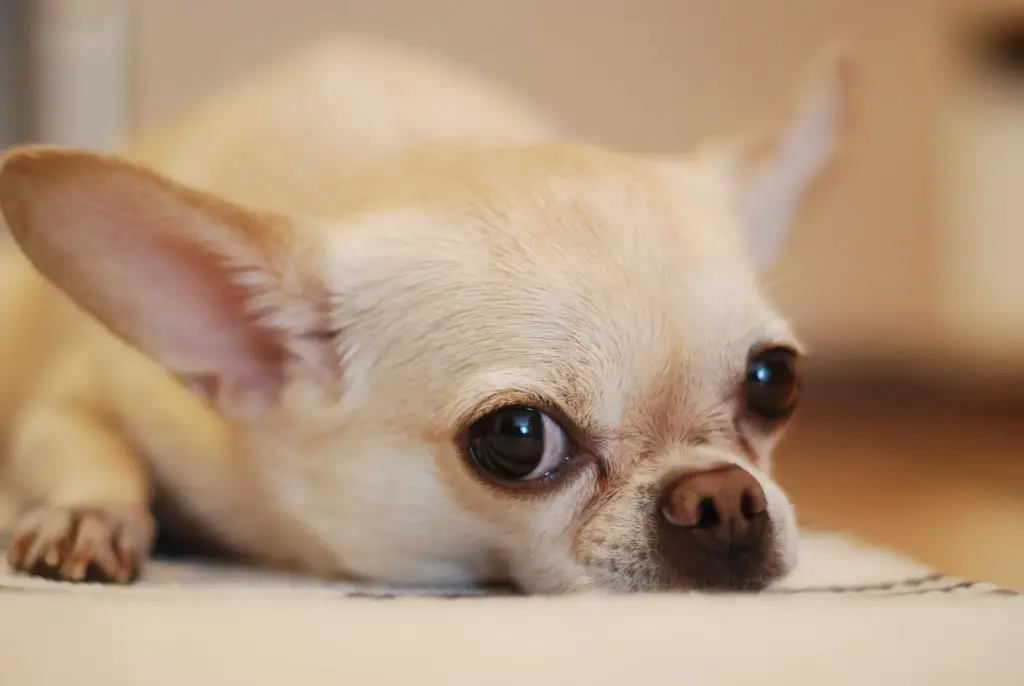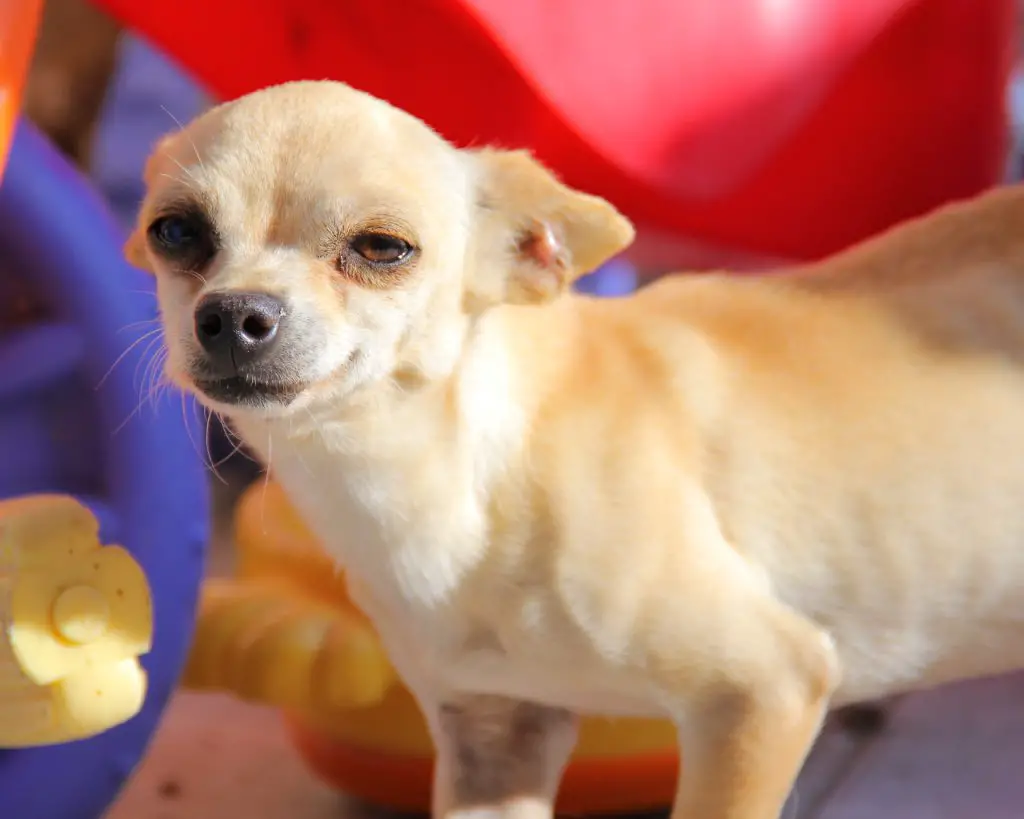Chihuahuas are one of the most popular breeds of dogs in the United States. They are often seen as a symbol of wealth and luxury and are favored by celebrities and other dog owners for their small size and adorable faces.
But what many people don’t know is that Chihuahuas can be very difficult to take care of, and some may even choose to starve themselves rather than eat or drink.
In this blog post, we will explore the reasons why Chihuahuas may choose to starve themselves, and what you can do to prevent it from happening.
- Key Takeaway
- Will Chihuahuas Starve Themselves?
- How Long Can a Chihuahua Go Without Eating?
- What Can I Do If My Chihuahua Doesn’t Want To Eat?
- What Treats Do Chihuahuas Like?
- FAQs
- Q: What should I do if my Chihuahua is not eating?
- Q: How often should I feed my Chihuahua?
- Q: What type of food is recommended for Chihuahuas?
- Q: Can Chihuahuas eat human food?
- Q: How can I make my Chihuahua eat when they are being picky?
- Q: Should I free-feed my Chihuahua?
- Q: Can Chihuahuas have food allergies?
- Q: How can I encourage my Chihuahua to eat their dry food?
- Q: What are some signs of a Chihuahua not getting enough food?
- Conclusion and final thoughts
Key Takeaway
- While Chihuahuas can refuse to eat if they don’t like their food, making them seem as though they’re starving themselves, no healthy dog, including Chihuahuas, will intentionally starve itself to death.
- A healthy Chihuahua, like most dogs, can typically survive three to five days without food as long as they’re still drinking water, but it’s not ideal and any longer could warrant a vet visit.
- If your Chihuahua doesn’t want to eat, you can try making their food more appetizing by adding warm broth, mixing in some wet food, or offering strong-smelling foods, but if they continue to refuse, it’s best to consult with a veterinarian.
Will Chihuahuas Starve Themselves?

Yes. If a Chihuahua doesn’t like their food, it might refuse to eat it. This can be dangerous for the Chihuahua because they could become malnourished. If a Chihuahua isn’t eating, its owner should take them to the vet to make sure there isn’t another problem causing them not to eat.
Chihuahuas are known as the “starving dog” breed for a reason. If you’re not careful, they will quickly lose weight and become malnourished.
Signs that your Chihuahua is starving itself include lethargy, loss of appetite, and weight loss.
If you think your Chihuahua is starving itself, take it to the vet immediately for a check-up. malnutrition can lead to other health problems down the road.
If your vet determines that your Chihuahua is malnourished, they will likely put him or her on a special diet and recommend supplements to help them gain weight.
There are many different reasons why Chihuahuas will starve themselves, and it’s important to find out why so that the dog can get the nutrition they need. Some common reasons why a Chihuahua might not like their food are if the food is too bland or if the food is too spicy.
Owners can experiment with different types of food until they find one that the Chihuahua likes. It’s also important to make sure that the food is of good quality and that it doesn’t contain any harmful ingredients.
How Long Can a Chihuahua Go Without Eating?

A Chihuahua can usually go without eating for up to two days. However, if the chihuahua has not eaten in more than three days, it is recommended to take the chihuahua to a veterinarian. A chihuahua that has not eaten for more than four days should be considered an emergency.
If you are unable to take your chihuahua to a veterinarian, then you should attempt to give the chihuahua water and try to get it to eat something soft like wet dog food or boiled chicken. If the chihuahua will not eat or drink, then you should contact a veterinarian immediately.
Dogs can live up to two weeks without food, but they will become weak and dehydrated. After about a week without food, a dog’s organs will start to shut down. If a dog does not get food within two weeks, he will die.
Dogs are scavengers and are able to eat things that humans cannot eat, so they can survive longer than two weeks without food. However, it is not healthy for them and they will eventually die if they do not get food.
If your chihuahua is acting lethargic, vomiting, has diarrhea, or is losing weight, then it is likely that the chihuahua is not eating enough and needs to be seen by a veterinarian. A chihuahua that is not eating enough will become dehydrated and can go into shock.
Signs of shock in a chihuahua include pale gums, cool extremities, weak pulse, and shallow breathing. If your chihuahua exhibits any of these signs, then you should take it to a veterinarian immediately says Canine Journal.
What Can I Do If My Chihuahua Doesn’t Want To Eat?

If your Chihuahua is not eating, there are a few things you can do to help get them interested in food again. First, try offering a different type of food. Some dogs may be more inclined to eat if the food is new or different.
You can also try warming up the food slightly before serving it. This may make it more appealing to your dog. Lastly, you can try hand feeding your dog some of their favorite foods. This will help get them interested in eating again and will also help to strengthen the bond between you and your pet.
If your Chihuahua is a picky eater, you may find yourself struggling to come up with ways to make sure he or she is getting the nutrition they need. Fortunately, there are some things you can do to help your pup out. Here are a few tips:
- Try feeding them smaller meals more often throughout the day instead of one large meal. This will help keep their blood sugar levels more consistent and make it easier for them to digest their food.
- Make sure their diet is high in protein and fiber. This will help keep them feeling full and satisfied after eating.
- Offer them a variety of different foods to eat. This will help ensure that they’re getting all the nutrients they need.
- Supplement their diet with a high-quality dog food vitamin supplement. This will help fill in any nutritional gaps they may have.
If you follow these tips, your Chihuahua should start to become a more willing eater. Just be patient and keep trying different things until you find what works best for them. Good luck!
What Treats Do Chihuahuas Like?
Some popular dog treats that Chihuahuas like are Milk Bones, Beggin’ Strips, and Busy Bones. Chihuahuas seem to love anything that is crunchy and savory. However, it is important to only give your Chihuahua treats in moderation. Excessive treats can lead to obesity and other health problems.
There are also many healthy snacks that you can give your Chihuahua instead of processed treats. Some good examples are fresh fruits and vegetables, boiled chicken, or even a piece of toast. If you’re looking for something a little more exciting, there are plenty of recipes online for homemade dog treats. Your Chihuahua will love you for it!
There are many different homemade Chihuahua treats that you can make for your pup. Some of the best include:
- Cooked chicken or beef liver
- Baked sweet potato or yam slices
- Peanut butter and banana dog biscuits
- Carrots or green beans cut into small pieces
- Honeycomb cereal mixed with water to make a soft dough (let it dry out before giving it to your pup)
All of these treats are healthy and nutritious, and your Chihuahua will love them! Be sure to supervise your pet while they are eating any type of treat, especially if it is a new one for them.
FAQs
Q: What should I do if my Chihuahua is not eating?
A: If your Chihuahua is not eating, it could be due to several reasons such as dental problems, illness, stress, or food preferences. First, make sure there are no underlying health issues by taking your dog to the vet. If there are no health concerns, try offering different types of food or warming up the food to enhance its aroma.
Q: How often should I feed my Chihuahua?
A: The feeding frequency for Chihuahuas can vary based on their age, size, and activity level. Generally, adult Chihuahuas should be fed two meals a day, while puppies may require three to four small meals. It’s best to stick to a consistent feeding schedule to maintain their metabolism and prevent overeating.
Q: What type of food is recommended for Chihuahuas?
A: High-quality commercial dog food that is specifically formulated for small breeds is typically recommended for Chihuahuas. Look for food with a balanced nutritional profile, including adequate protein and fat content. Avoid feeding them table scraps or food that is not suitable for dogs.
Q: Can Chihuahuas eat human food?
A: While some human foods can be safe for Chihuahuas in moderation, it’s important to be cautious. Many human foods can be toxic to dogs, such as chocolate, onions, garlic, grapes, and raisins. It’s best to consult a veterinarian to determine which human foods are safe to feed your Chihuahua.
Q: How can I make my Chihuahua eat when they are being picky?
A: If your Chihuahua is being picky about their food, there are a few strategies you can try. Mixing a small amount of wet food or low-sodium chicken broth with their regular food can add flavor and entice them to eat. You can also try hand feeding or using puzzle toys to make mealtime more engaging for your Chihuahua.
Q: Should I free-feed my Chihuahua?
A: Free-feeding, where food is left out all day for the dog to eat at their own pace, is not recommended for Chihuahuas. They are prone to obesity and overeating, so it’s better to establish a regular feeding schedule and portion control their meals to ensure they maintain a healthy weight.
Q: Can Chihuahuas have food allergies?
A: Yes, Chihuahuas, like any other breed, can have food allergies. Common allergens for dogs include ingredients such as grains, chicken, beef, and dairy products. If you notice signs of allergy such as skin irritation, gastrointestinal upset, or excessive itching, it’s best to consult a veterinarian to determine the cause and find an appropriate diet.
Q: How can I encourage my Chihuahua to eat their dry food?
A: If your Chihuahua is not enthusiastic about eating dry food, you can try a few tricks. Adding warm water or low-sodium chicken broth to the kibble can soften it and enhance its aroma. You can also try mixing a small amount of wet food or sprinkling a treat topper on top of the dry food to make it more enticing.
Q: What are some signs of a Chihuahua not getting enough food?
A: Some signs that your Chihuahua may not be getting enough food include weight loss, decreased energy levels, dull coat, and increased hunger. However, it’s important to rule out any underlying health issues or dental problems that may be affecting their appetite. If you are concerned, consult with a veterinarian for guidance.
Conclusion and final thoughts
In conclusion, while it may seem concerning and frustrating when a chihuahua refuses to eat, it is important to remember that this breed has unique dietary needs and preferences.
It is not uncommon for them to self-regulate their food intake or become picky eaters.
However, it is crucial for owners to monitor their chihuahua’s weight and consult with a veterinarian if they notice any significant changes in their appetite or behavior.




